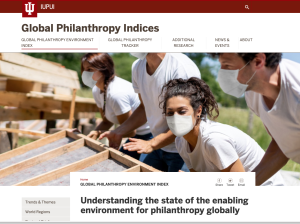It appears there is some trouble brewing for the nonprofit sector across the pond. New data from the National Council for Voluntary Organisations (NCVO) indicated that rising inflation has slowed revenue gains for charities in the United Kingdom.
The London-based organization released its annual UK Civil Society Almanac today which studied the period from 2010-2011. While the report showed that charities generated £38.3 billion in revenue during that period – an increase of £2 billion from the previous year – those gains were essentially wiped out by a 5 percent inflation rate. When that factor was included, the charitable sector’s total income was nearly identical to its levels from 2009-2010.
“This was clearly the year we started to see charities’ struggles reflected in the bottom line,” said Sir Stuart Etherington,” chief executive of NCVO. “While many charities continued to spend during the recession, perhaps to meet growing demand, it seems some were running out of steam by this point.”
While charities were continuing to spend money, as Etherington noted, the Almanac reported that it was being done at a slower rate than previous years. Spending stood at £36.8 billion in 2010-2011, a decrease of £800 million compared to the previous year’s inflation-adjusted figure of £37.6 billion. It was the lowest charitable spending has been in the UK since 1996.
Other data from the report included:
- The median donation given in a typical month was £11, a decrease of £1 compared to the period covering 2009-2010.
- Individuals were the biggest source of income for charities, accounting for £6.6 million of the £14.7 million in revenue. This was an increase of £945 million over the previous year.
- Sector assets topped £100 billion for the first time, regaining value lost during the recession. Income from investments remained low (£68.4 million), however, and reserve levels did not recover to the same extent as assets overall.
- The proportion of income from government grants and contracts remained steady after a decade in which contract income had consistently increased and grant income decreased
- Contract income from government grants by itself increased to a worth of £11.2 in 2010-2011, an increase of 151 percent from the previous year. Much of this growth took place in the second half of the decade as government spending on public services increased.
- More than four-fifths (83 percent) of the sector’s statutory income is received by 3,357 organizations with an annual income of £1 million or more.
- On average, organizations with an income greater than £100,000 receive 38 percent of their income from the state. Medium sized charities receive 15 percent of total government funding to the sector – £2.1 billion – yet statutory funding accounts for 32 percent of their overall income.
The research for the UK Civil Society Almanac 2013 was done before the country was in a recession and before the government decided to cut public spending. “We expect to see the effect of public spending reductions in future years’ data,” said Etherington, “but it’s important to remember that while only around one in four charities receive any income from public bodies, all charities feel the effects of inflation.”
Adrian Sargent, the Robert F. Hartsook Professor of Fundraising at the Center on Philanthropy at Indiana University and one of the UK’s top fundraisers, acknowledged that the current austerity measures will have an effect on nonprofits, but didn’t think they would severely impact giving.
“In the U.K. as in the U.S. giving is not very elastic,” explained Sargent. “It takes relatively large changes in the economy to impact significantly on giving. The severe recession certainly pushed giving down, but it is recovering and I can’t personally see our austerity measures having much impact on that process.”
NCVO was first established in 1919 as the National Council of Social Services and since then has made it a mission to bring various voluntary bodies together and into closer relationships with government departments. You can read more data from the Almanac at http://data.ncvo-vol.org.uk/












